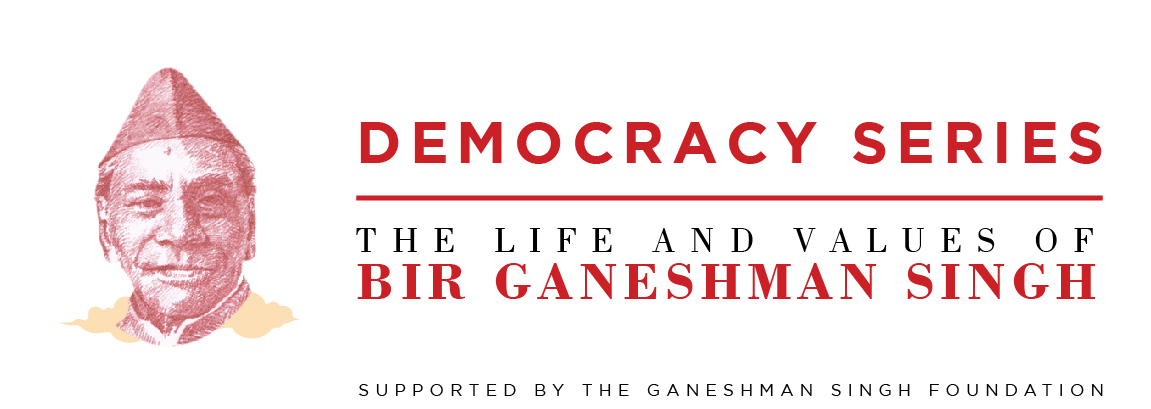Residents pour onto the streets to celebrate their victory:
The next day, on 9th April, 1990, at 6:30 a.m. Radio Nepal announced the government’s decision to remove the curfew orders. By 7:00 a.m, it seemed as if entire Kathmandu was out on the streets celebrating.
Residents took out huge processions to mark the end of the Panchayat system, and the ushering of a new, democratic Nepal. As the hours progressed, the numbers swelled.
In the afternoon, the crowd gathered at Khulla Manch to hear their leaders speak. Ganesh Man Singh spoke first. “We asked for a multi-party system; that has been addressed. There are several issues that need to be addressed. Only, when all issues are addressed, then we will have become a democratic country”, Singh said as the crowd applauded in unison.
Similarly, other leaders including Krishna Prasad Bhattarai, Sahana Pradhan, Mangala Devi Singh, Girija Prasad Koirala, and Tulsi Lal Amatya also made their respective addresses.
During Girija’s turn, he started by saying “This victory is not only ours, but also of the King’s and the leaders of the Panchayat System…” As soon as he said these words, the crowd started booing him. They would not calm down despite several attempts.
Finally, Singh had to readdress the people – and said:
“How can you, the same people who demanded and fought for democracy and human rights not have patience to hear a leader’s speech in its entirety? How can we call you democrats if you will not listen to another person’s opinion? What kind of democracy are we seeking to establish if we cannot listen to a different opinion?”
Only after Singh said the above words, did the crowd settle down.
Panchayat System’s dissolution:

On 10th April, 1990, leaders of Nepali Congress and the United Left Front met to decide that the Panchayat Government must indeed be dissolved. On 11th April, they published the following eight point demands:
- As per the Royal Proclamation of 8th April, 1990 which decreed that Nepal would be initiating a multi-party system, the current Panchayat government and the Council of Ministers have become non-referential; therefore we demand their immediate dissolution.
- Immediate cancellation of any section, and sub-sections in Nepal’s constitution which are against the multi-party system.
- The immediate dissolution of Panchayat bodies in district and local levels without disrupting daily activities of the public.
- Nationalisation of movable and immovable properties belonging to the Panchayat organization.
- Cancellation of active cases and immediate release of political prisoners imprisoned during the People’s Revolution, or any pro-democracy movement earlier to the movement.
- Financial support to the families of those martyred in the People’s Movement, and medical assistance to those who are injured.
- Formation of a Constitutional Commission with active representation of leaders from United Left Front and Nepali Congress.
- A commission to investigate the violence used against protesters to suppress the national people’s movement.
Singh himself presented the eight point demand to King Birendra. After several rounds of discussions, on 16th April, 1990, King Birendra Bir Bikram Shah announced the dissolution of the Panchayat System.
Formation of an interim government, Singh rejects a Prime Ministerial position:

After the announcement, Singh sat down with King Birendra to discuss the formation of an interim government. During the course of the conversation, King Birendra repeatedly offered Singh to become the nation’s Prime Minister. However, Singh rejected the offer – citing his health condition as a possible deterrent towards optimum performance.
Similarly, Singh recommended Krishna Prasad Bhattarai for the position of the Prime Minister. And a new council of ministers which included Krishna Prasad Bhattarai as Prime Minister, Sahana Pradhan as Minister of Industry and Commerce, along with Keshar Jung Rayamajhi, Achyut Raj Regmi, Mahendra Narayan Nidhi, Yog Prasad Upadhyaya, Nilambar Acharya, Marshall Julum Shakya, Jhalanath Khanal, Devendra Raj Pandey, and Mathura Prasad Shrestha in other portfolios was subsequently formed.
The main responsibilities of the new interim government was to ensure a smooth transition towards a constitutional monarchy, drafting a new constitution, and paving way for a nationwide general elections.





